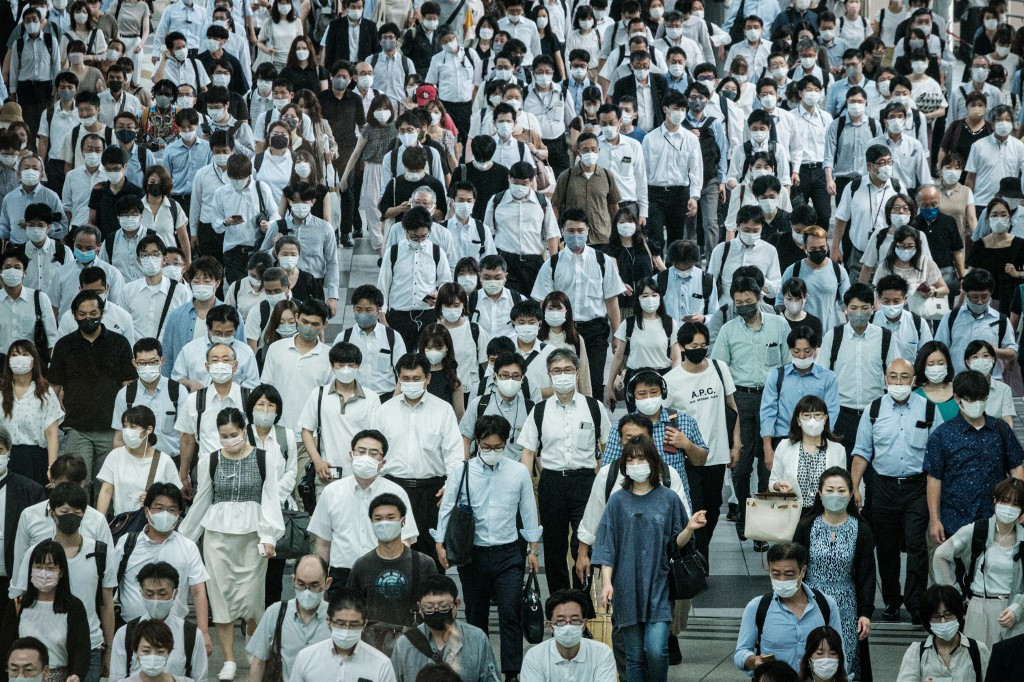Popular Reads
Top Results
Can't find what you're looking for?
View all search resultsPopular Reads
Top Results
Can't find what you're looking for?
View all search resultsJapan's new COVID-19 cases exceed 15,000 for first time
In Tokyo, the daily coronavirus cases confirmed reached a record 5,042 on Thursday, topping the 5,000 mark for the first time, the metropolitan government said, as a resurgence of the virus places a strain on the medical system in Japan.
Change text size
Gift Premium Articles
to Anyone
N
ewly reported daily COVID-19 cases in Japan exceeded 15,000 for the first time, public broadcaster NHK reported on Thursday, after the Tokyo metropolitan government reported a record-high 5,042 new infection cases in the capital.
In Tokyo, the daily coronavirus cases confirmed reached a record 5,042 on Thursday, topping the 5,000 mark for the first time, the metropolitan government said, as a resurgence of the virus places a strain on the medical system in Japan.
Tokyo, hosting the Olympics while under its fourth state of emergency over the pandemic, reported a record figure for the second straight day after logging 4,166 cases Wednesday.
The Japanese government decided the same day to expand its COVID-19 quasi-state of emergency to eight more prefectures, with the serving of alcohol banned in principle, as the highly contagious Delta variant of the coronavirus is spreading in the areas.
The move comes after the government on Monday added Osaka and three prefectures near the capital to its virus state of emergency, already in place in Tokyo and Okinawa, and imposed the quasi-emergency on five other prefectures through the end of August.
"Infections are spreading at an unprecedented level in the metropolitan area and elsewhere," Prime Minister Yoshihide Suga said after making the decision.
"With the increase of those infected, the number of patients in serious condition is also on the rise," Suga said, while noting the Delta variant now accounts for about 90 percent of coronavirus cases in Tokyo and the proportion is high in many other locations.
The addition of the eight prefectures -- Fukushima, Ibaraki, Tochigi, Gunma, Shizuoka, Aichi, Shiga and Kumamoto -- was finalized at a task force meeting, with anti-virus measures in effect from Sunday through Aug. 31.
Yasutoshi Nishimura, minister in charge of Japan's coronavirus response, said the number of COVID-19 patients in serious condition has doubled in Japan over the past two weeks, putting a strain on the medical system.
Under the quasi-state of emergency, which carries fewer restrictions on business activity than the state of emergency, dining establishments not serving liquor are requested to close at 8 p.m.
Only when the number of infections indicates a downward trend, may provision of alcohol be allowed with a governor's approval until 7 p.m. at establishments taking anti-virus steps in areas under a quasi-emergency.
Under the state of emergency, restaurants and bars serving alcohol or offering karaoke are asked to shut during the period while the government provides money for compliance. Those not serving liquor are requested to close at 8 p.m. as well and easing the alcohol ban is not allowed during the period.
The five other prefectures currently under the quasi-emergency are Hokkaido, Ishikawa, Kyoto and Hyogo as well as Fukuoka, which asked the central government on Thursday to impose a tougher state of emergency.
Hiroshima Prefecture in western Japan had requested to be included under the quasi-emergency measures, but the central government rejected its demand, saying the virus situation there is not currently at a serious level.










